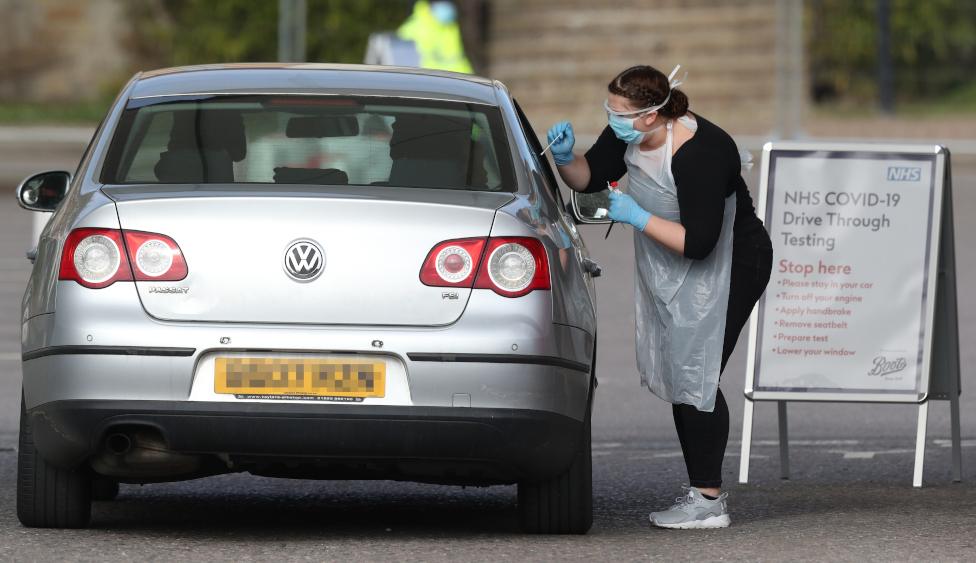Scottish coronavirus deaths increase by 50
- Published
'We have been advised of additional coronavirus deaths'
New figures have shown that a further 50 people with coronavirus have died in Scotland, bringing the total to 126.
Nicola Sturgeon said the figure included 10 deaths over the past 24 hours, as well as a further 40 from previous days.
The Scottish government said 2,602 people had now tested positive for the virus, up from 2,310 on Wednesday.
The first minister said "every single death from this virus is a tragedy" and that her thoughts were with families.
She also confirmed that there are 1,282 patients currently in hospital who have been diagnosed with the virus, of whom 162 are in intensive care.
Ms Sturgeon said delays in notifying families about deaths via one laboratory was behind the additional 40 deaths being added to the overall figure on Thursday.
However the Scottish government is also changing the way it compiles data on the number of coronavirus deaths in the country.
Only laboratory-confirmed cases reported by health boards are currently counted, but records from the death registration process will soon be added to this.

From next week, the daily figures will also start to include all deaths where the virus is officially "suspected" to have been a factor, even if it has not been confirmed by testing.
Ms Sturgeon said this would increase the number of deaths on record, but would not speculate about how significant this could be.
She said she was "determined that information continues to be as accurate, comprehensive and up to date as possible" and that her government will be "as transparent as we can be".


The sharp in rise in deaths announced today exposes another gap in our knowledge of how this epidemic is advancing.
The rise in deaths by an additional 40 previously unknown or undeclared cases may be, as was explained, down to a single lab not officially recording the deaths as they happened.
We are expecting more information on how this number of deaths was missed. Although the chief medical officer told me she was not surprised by the increase, it does seem to mean we are further along the curve monitoring deaths than it previously appeared.
The Scottish government is now moving to a new definition of coronavirus deaths, relying on details from the National Records of Scotland so that anyone whose death certificate mentions Covid-19 will now be included in the daily totals.
Today's figures also underline how much information we don't know about the people behind the numbers of deaths in Scotland. For example, we don't have a breakdown of ages, gender, how many had underlying conditions, or how long they were in intensive care for.
The government says that we are now entering a phase where the number of deaths means that patient confidentiality is no longer such an issue.
We are expecting to get much more of this detail next week and a fuller picture of the impact of this pandemic in Scotland.

The first minister also said testing for the virus had been "very rapidly expanded", with a focus on testing key workers including healthcare staff and their families.
She said the government initially had capacity to test around 390 samples a day, but that figure has risen to 1,900 tests a day - with the aim of carrying out 3,500 a day by the end of April at the latest.
Ms Sturgeon said ministers were continuing to look at ways of expanding testing and were taking part in "four country initiatives with the rest of the UK" to add to capacity.
But she said due diligence had to be carried out before new laboratories could be used to make sure testing is safe and has high quality standards.

And she stressed that testing key workers did not in and of itself mean they could return to work, saying: "I don't think testing is a side issue, external, but I want to be very clear what testing can and cannot achieve.
"It tells us right now whether someone with symptoms has the virus or not - it doesn't tell us if they're going to get symptoms, or whether, once they've recovered, they had the virus."
Ms Sturgeon said there was not an "either/or" choice between testing and social distancing, saying there was "no quick fix".
She said: "We all want this phase of our lives to be over as soon as possible, but it's unlikely this will be in us a few weeks. We are in this for the long haul.
"I know how tough this is, but please, please stick with it - you are helping us save lives."

A SIMPLE GUIDE: How do I protect myself?
AVOIDING CONTACT: The rules on self-isolation and exercise
LOOK-UP TOOL: Check cases in your area
MAPS AND CHARTS: Visual guide to the outbreak
VIDEO: The 20-second hand wash
